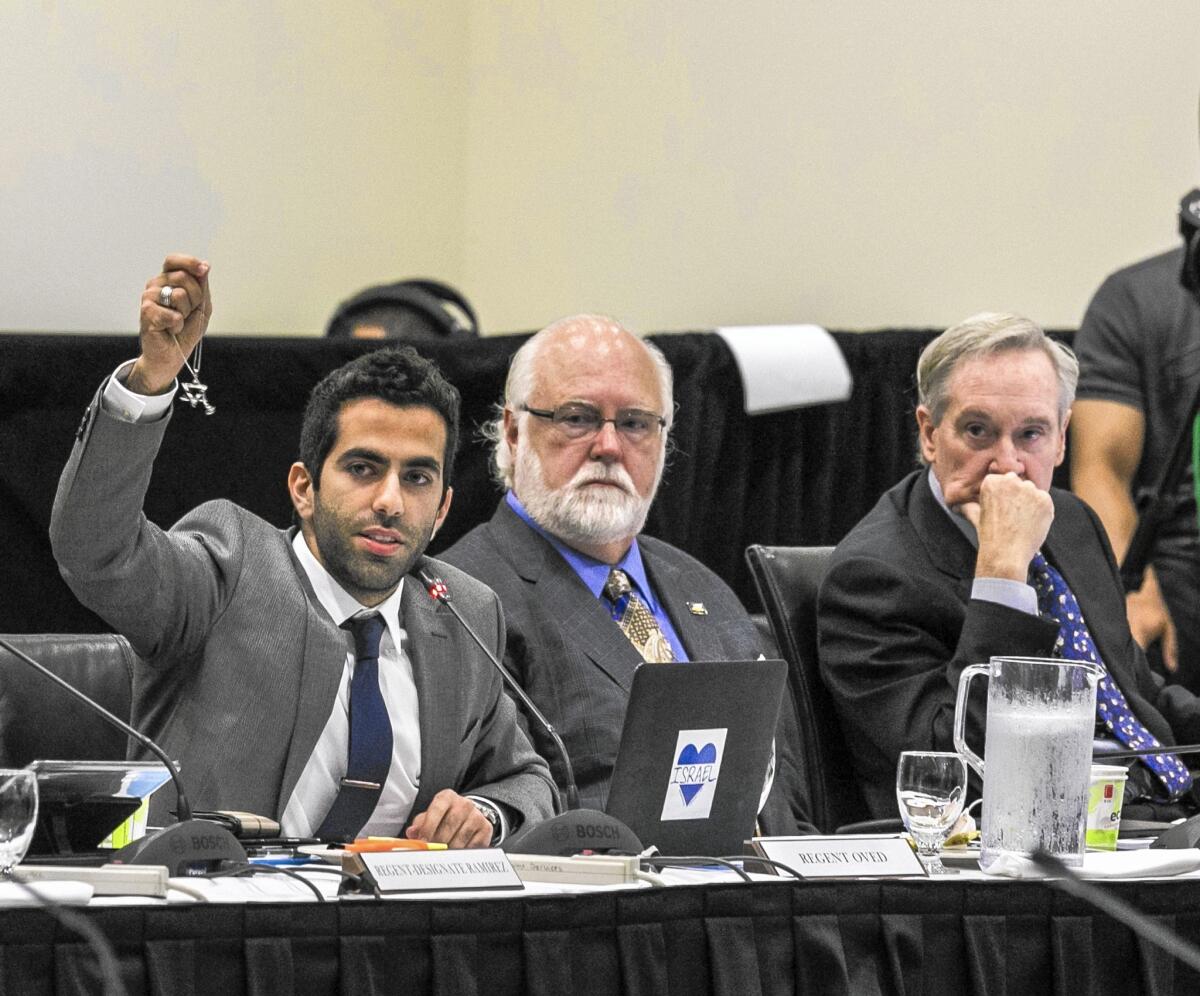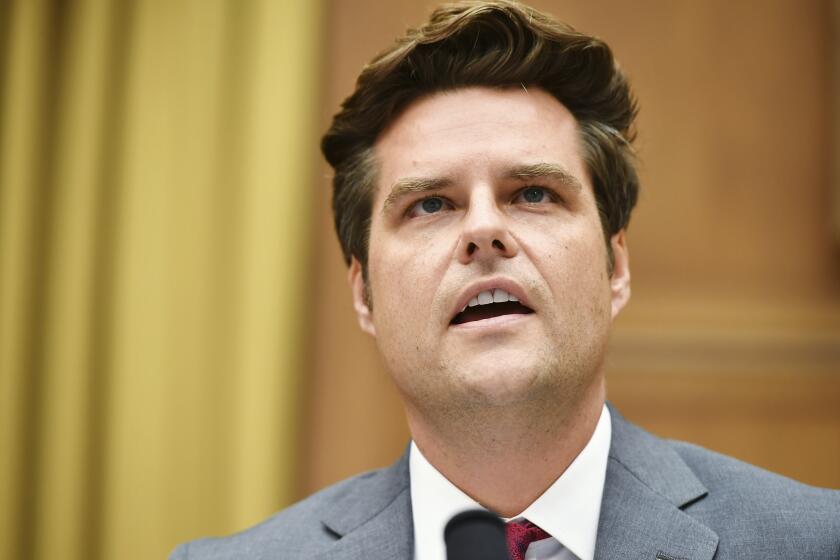Op-Ed: Anti-Zionism is a hateful ideology. It has no place at UC

The UC’s Student Regent, Abraham Oved, holds up a Star of David as he addresses the Board of Regents meeting at UC Irvine to discuss a controversial policy statement on intolerance on Sept. 17, 2015.
Last week, a UC Regents working group released a proposed set of Principles Against Intolerance, created in response to a series of anti-Semitic incidents on UC campuses. On March 23, the Regents will vote on whether to officially adopt those principles. Controversially, the document not only condemns anti-Semitism, but also anti-Zionism.
We asked UC faculty members to argue for and against the statement. Read the opposing view here.
----
As a professor at UCLA since 1969 and a witness to the rapid deterioration of our campus climate, I believe the working group’s statement is a genuine attempt to deal with a lingering problem that has caused Jewish students and their allies a great deal of agony, interfered with their studies and severely tarnished the reputation of our university system.
Some critics, including the Los Angeles Times editorial board, object to the statement because “it conflates anti-Semitism with anti-Zionism.”
That’s not the case. A careful reading reveals that exactly the opposite is true; the statement explicitly separates the two issues, saying: “Anti-Semitism, anti-Zionism and other forms of discrimination have no place at the University of California.”
The statement, in other words, condemns anti-Zionism not because it closely mimics anti-Semitism, but on its own terms — and rightly so.
Anti-Semitism targets Jews as individuals; anti-Zionism targets Jews as a people. Anti-Semitism would deny Jews equal standing as human beings; anti-Zionism would ban Israel from equal membership in the family of nations.
If we examine anti-Zionist ideology closely, we see that its aims are: to uproot one people, the Jewish people, from its homeland, to take away its ability to defend itself in sovereignty, and to delegitimize its historical identity. It is racist and fundamentally eliminationist.
Existing UC guidelines opposing anti-Semitism are grossly inadequate in curbing the current wave of anti-Jewish hostilities on campuses, which by and large are directed not against those who practice their religion but against those suspected of supporting Israel.
Zionism sustains the lives, creativity, dignity and identity of millions of peace-seeking and war-weary human beings.
For instance, the words “Zionists should be sent to the gas chamber” were found on a bathroom wall at UC Berkeley in March 2015.
Anti-Jewish factions on UC campuses and elsewhere defend themselves by saying: “I love Jews, it is only the Zionist Jews that I hate.” But that’s a hateful cliche, and a nonsensical one. They’re attempting to separate Jews from the defining symbol of their historical identity, which is impossible.
Another line of attack against the working group’s statement is that it will harm free speech. Again, that’s not the case.
The 1st Amendment protects anti-Semitic, Islamophobic and white supremacist speech; nevertheless, it’s socially unacceptable to vent racist views publicly. Just so, the UC regents have not banned anti-Semitic, Islamophobic or white supremacist speech, and do not propose to ban anti-Zionist speech; rather, the regents rightly want to make it clear that the latter is beyond the pale of civil discourse.
So if the regents adopt the principles against intolerance, they won’t officially restrict free expression. But, and here is an important distinction, they will send a message to the community that anti-Zionism, like Islamophobia and other hateful ideologies, has “no place,” culturally, “at the University of California.”
Some critics object to comparing Zionophobia with Islamophobia, as I have, arguing that Zionism is a political belief while Islam is a religion. In the modern court of ethics, however, religion does not have a monopoly on human sensitivity. That is to say, religions are not entitled to a greater protection from discrimination than other identity-forming narratives, including those based on race, gender, national origin or historical lore.
On UC campuses today we find a glaring imbalance: Islamophobia is considered a great sin, while Zionophobia is considered politically cutting-edge, almost cool, like Maoism in the 1960s.
The regents report now reminds us that Zionism has a moral dimension to it that goes beyond political opinion. Zionism sustains the lives, creativity, dignity and identity of millions of peace-seeking and war-weary human beings. To assert that Israel should not exist is, then, not merely controversial, like asserting that the income tax should not exist; it is also thoroughly annihilating and thoroughly inappropriate on UC campuses.
Judea Pearl is Chancellor’s professor at UCLA, specializing in artificial intelligence and human reasoning. He is the president of the Daniel Pearl Foundation, named after his son.
Follow the Opinion section on Twitter @latimesopinion and Facebook
More to Read
A cure for the common opinion
Get thought-provoking perspectives with our weekly newsletter.
You may occasionally receive promotional content from the Los Angeles Times.










